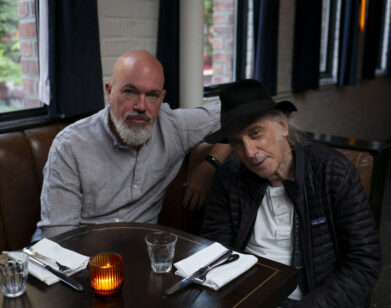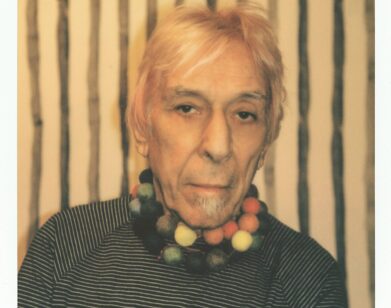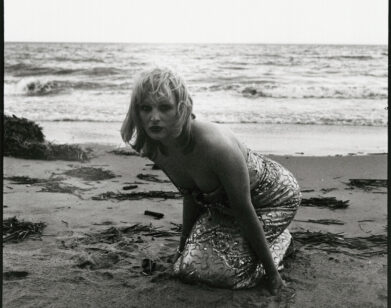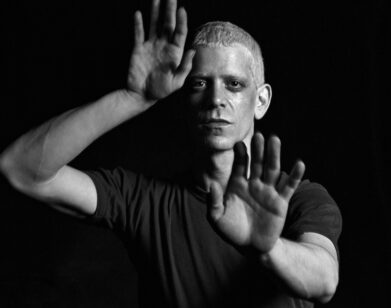TOUR DIARY
“We Won Them Over”: Michael Imperioli and ZOPA Take Primavera Sound
Michael Imperioli wrote his first song before anyone ever knew him as Christopher Moltisanti. For almost 20 years, the 57-year-old actor has been in a band called ZOPA alongside Elijah Amitin and Olmo Tighe, who cheekily calls the trio “the least famous famous band.” 17 years ago, ZOPA was in over their heads, playing their first show in Lisbon to an audience of over 500 people after practicing for just two months. Now, they’re headlining gigs in the UK and playing Primavera Sound, the annual festival in Barcelona, which this year debuted its sister festival in Madrid.
Their show at the Teatro Eslava has just finished, but the sun hasn’t yet set. There’s a golden hour glow bathing the Plaza Mayor when Imperioli and his bandmates take their seats around a large wooden dining room table at their hotel to reflect on their mini-European tour, long-lost cover songs, Buddhist philosophy, and how filming the The White Lotus in Sicily inspired Imperioli’s songwriting process.
———
MIRA KAPLAN: Elijah, you greeted the audience tonight in Spanish. Do you have Latin roots?
ELIJAH AMITIN: No, but my dad spoke Spanish.
MICHAEL IMPERIOLI: He was a Latin musician, Mike Amitin.
AMITIN: He was a salsa musician in the 60s and 70s in New York and he would curse out the car window in Spanish. Cono carajo cono. He would talk to his bandmates on the phone for hours in Spanish and would give them medical advice, Tu sabe, necesita aspirin! That sort of thing.
OLMO TIGHE: The first time I met Elijah’s father he was playing bass in Elijah’s room in high school. He would leave and come back a few minutes later, play some more bass, drop some knowledge on a great player or cool song, and then leave again.
IMPERIOLI: In Barcelona we greeted them in Catalan. I said, bona tarda germans i germanes.
KAPLAN: Olmo, did you have any funny language moments?
TIGHE: I feel like most of my moments are funny language moments.
IMPERIOLI: So we started in London, this mini-tour. That wasn’t part of Primavera festival. We headlined that show. Originally we were going to play at a place called The Moth that sold at 300 seats and they moved it to a bigger venue called The Garage. There were like 550 people there and they were very enthusiastic. A lot of people knew the music, which was really fun. People were singing along in a way we haven’t quite experienced yet. It was pretty wild. And then the festival was in Barcelona and Madrid. We were opening acts for both of those bills. It was a little bit different because a lot of people came for other bands who didn’t necessarily know us but—
AMITIN: We won them over.
IMPERIOLI: I think we won them over, I think they were getting it. It was fun. It was a challenge because I got sick and was in bed for two days right before we left. And was flying with a bad cold.
AMITIN: Somehow, I got Michael’s cold.
KAPLAN: Tour life.
AMITIN: I was feeling that today. It was a little hard vocally, I was capping notes at a certain level.
KAPLAN: You hit some extended high ones tonight, like in “A Still Life.”
IMPERIOLI: We worked on “A Still Life” with John Agnello, he and Elijah produced our new album. That’s currently something we’re shopping around. We’re really happy with it. Most of it is stuff we’ve written in the last two years. And one is the cover of “Ocean / Heroin,” which we did tonight. That’s been a lot of fun to play.
KAPLAN: People sing along to Lou Reed in Spain.
IMPERIOLI: People respond to that. When we played in LA, the second time we played in that pub in Hollywood, the first time was the Silver Lake Lounge, we played “Candy Says” and “Heroin” together.
AMITIN: Did we really?
IMPERIOLI: Yeah. [Laughs]. This was back in 2012. We did The Velvet Underground’s “Candy Says” and “Heroin.” And I heard this acoustic version of “Ocean” I had never heard before. It was just Lou on acoustic guitar. There was something so beautiful about that recording and the vulnerability in his voice and the innocence to it. We learned that song and with the last chords we were just messing around. The last chords are from “Heroin.” We did it live. Galaxie 500, for me, was very much an influence on ZOPA, their approach and their sound and their musicianship as a trio. They did two covers that were some of the best I ever heard. One was “Ceremony,” and one was “Don’t Let Our Youth Go to Waste,” but they made it their own. Their sound was so exciting. I saw them live many times.
AMITIN: A big part of our sound, with the “Ocean/Heroin” cover especially is the way Olmo approaches it orchestrally. It’s really unique.
KAPLAN: The cymbals!
TIGHE: The cymbals are fun on that one.
AMITIN: I don’t know where you came up with all that. We’re kind of following you on that one.
TIGHE: I like the way the medley speeds up and slows down.
IMPERIOLI: It becomes your own thing with your own band’s flavor and style. Because most people don’t know “Ocean.” Velvet Underground fans obviously do, but a lot of people know “Heroin.” Lou recorded “Ocean” both solo and with the Velvet Underground, they even have different lyrics, some of the verses.
KAPLAN: Which lyrics do you use?
IMPERIOLI: We use the solo version. The lyrics are quite different, it’s strange.
KAPLAN: So the last time you were in Europe together was Portugal.
IMPERIOLI: The very first show we ever played was in Lisbon. Which in hindsight was ridiculous because we had only been together for a couple months. Back then we did a cover of “Every Man Has a Woman Who Loves Him,” a Yoko song, but mostly originals. Then I went off to do a movie in Portugal. My friend was involved in a music club which we wound up making a movie about called Cabaret Maxime. So we had only been together two months. I had never really sung in public before. And 500 people showed up. We got to the venue and there was a line outside and I realized I was biting off more than I could chew. The energy was good, we played a long time too, an hour and ten minutes, all new songs, and it was really loud. The sound was a lot raw-er in the beginning than it is now. A lot of that was due to my own limitations, in a way.
AMITIN: It was much harder-edged.
KAPLAN: Do you and Olmo remember that gig?
AMITIN: I remember, it was great. We were all over our heads a bit. The show was sort of a blur.
IMPERIOLI: Last week, in London, we played “Roll It Off Your Skin,” which was the last song on the first album, because a bunch of people held up their phones and had “Roll It Off Your Skin” in big letters.
AMITIN: That was a cool thing. The audience will give you requests on the phone and you have to squint and look into the crowd and see what they’re saying. That song is particularly cinematic to me.
IMPERIOLI: That song is from the ‘80s.
AMITIN: One reason that song resonates with some people might be that it’s a bridge between your two careers for people, in their imagination, because it feels like a movie scene.
IMPERIOLI: Maybe.
KAPLAN: Speaking of cinematic songs, you’ve made music videos for two songs.
IMPERIOLI: That was all really my wife, Victoria [Imperioli]. She’s particularly suited to the music video format. She’s very visual and can think very abstractly and trusts her imagination. These images come and she trusts them and understands how to interpret them and transform them from imagination into reality. “A Still Life” hasn’t come out, but I think it’s really fascinating and beautiful. Music videos, I think, are a really underused and under-appreciated art form. Most of what you see are just commercials, sometimes because the budgets are really low, but still that doesn’t totally let people off the hook. There’s a real lack of imagination.
AMITIN: In the new one, we’re all butlers. The true identity of the band…
KAPLAN: Elijah, you once connected that song to The White Lotus.
AMITIN: Well, Michael wrote “A Still Life” in the hotel in Taormina, where they shot the show.
IMPERIOLI: The song was never really done until we all worked on it, but the chord progression and the melody, I started there. Two songs on the album were written in Sicily. It was very much in the air. I always travel with a guitar if I’m going anywhere for more than a few days.
KAPLAN: Some ZOPA songs have Tibetan lyrics, right?
AMITIN: I have to learn the Tibetan lyrics phonetically, first and foremost.
KAPLAN: Buddhism is a big ZOPA theme.
IMPERIOLI: Not long after I got into Buddhism, it made its way into the songs. It feels very important. The first song we played tonight is new, it’s called “Brilliant Moon.” The verse is a Tibetan prayer. And to be honest, as a Buddhist, saying those things and having people hear them is very positive. Because mantra, and that prayer, are seed syllables, so they connect vibrationally to chakras and subtle body things and they carry a certain purifying vibe. There’s something interesting and exotic musically about it, but also a very healing benefit to it.
KAPLAN: Are you going to record it?
IMPERIOLI: Why not?








